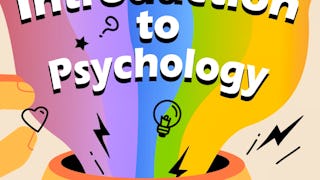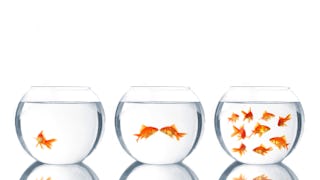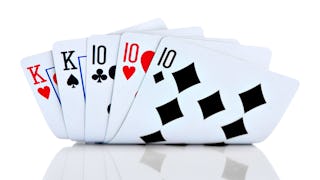This course introduces students to foundational areas in psychology across four key modules, including the biological basis of behavior, cognitive and emotional processes, theories of motivation and personality, and an introduction to psychological disorders. It offers students a basic yet comprehensive understanding of how psychological science explains thought, feeling, and behavior.



Expérience recommandée
Ce que vous apprendrez
Explain key psychological theories in biological, developmental, personality, and social domains.
Identify major figures and schools that shaped psychology as a scientific field.
Use the scientific method in psychology: form hypotheses, collect data, and analyze results.
Analyze study findings and relate them to real-life behavior and mental processes.
Compétences que vous acquerrez
- Catégorie : Human Development
- Catégorie : Culture
- Catégorie : Neurology
- Catégorie : Statistical Analysis
- Catégorie : Behavioral Health
- Catégorie : Stress Management
- Catégorie : Psychology
- Catégorie : Research
- Catégorie : Mental and Behavioral Health Specialties
- Catégorie : Human Learning
- Catégorie : Research Methodologies
- Catégorie : Biology
- Catégorie : Ethical Standards And Conduct
- Catégorie : Learning Theory
- Catégorie : Scientific Methods
- Catégorie : Mental Health
- Catégorie : Mental Health Diseases and Disorders
Détails à connaître

Ajouter à votre profil LinkedIn
juillet 2025
8 devoirs
Découvrez comment les employés des entreprises prestigieuses maîtrisent des compétences recherchées

Il y a 5 modules dans ce cours
This course introduces students to foundational areas in psychology across four key modules, including the biological basis of behavior, cognitive and emotional processes, theories of motivation and personality, and an introduction to psychological disorders. It offers students a basic yet comprehensive understanding of how psychological science explains thought, feeling, and behavior. By examining essential psychological concepts and theories, students will begin to critically reflect on human behavior in various contexts. The course encourages the application of these insights to one’s own experiences, relationships, and broader social environments.
Inclus
2 vidéos3 lectures
Psychology emerged as a scientific discipline in the late 19th century, evolving from philosophy and biology with pioneers like Wilhelm Wundt, who established the first psychology laboratory in 1879. Early theories included structuralism, focusing on introspection, and functionalism, which emphasized the purpose of behavior. Over time, various perspectives developed—such as behaviorism, psychoanalysis, humanism, cognitive psychology, and the biological approach—each offering unique insights into human thought and behavior. Today, psychology integrates these diverse theories to better understand mental processes and improve well-being across individuals and communities.
Inclus
5 vidéos1 lecture2 devoirs
Psychology research relies on systematic methods to study behavior and mental processes. Observation involves watching and recording behavior in natural or controlled settings to identify patterns without interfering. Correlational research examines the relationship between two variables, helping to predict outcomes but not determine cause and effect. Experimental methods involve manipulating one variable (independent) to observe its effect on another (dependent), allowing researchers to draw conclusions about causality under controlled conditions.
Inclus
6 vidéos1 lecture2 devoirs
The study of brain and behavior explores how biological processes influence thoughts, emotions, and actions, as well as the role of genetics (nature) versus environment (nurture) in shaping behavior. Neurons, the brain’s communication cells, transmit information through electrical impulses and chemical signals, forming complex networks that underlie all mental activity. The brain is made up of specialized structures, including lobes like the frontal (planning and decision-making), parietal (sensory processing), occipital (vision), and temporal (hearing and memory).
Inclus
5 vidéos1 lecture2 devoirs
The psychology of emotion, motivation, and stress examines how people experience feelings, what drives their actions, and how they respond to challenges. Emotions are complex reactions involving physiological arousal, expressive behavior, and conscious experience, influenced by both brain structures like the amygdala and social context. Motivation refers to the internal processes that initiate, direct, and sustain behavior, with theories like Maslow’s hierarchy of needs and drive-reduction theory explaining different types of motivation. Stress occurs when individuals perceive demands as exceeding their coping abilities, triggering physiological responses that can impact both mental and physical health.
Inclus
5 vidéos1 lecture2 devoirs
Obtenez un certificat professionnel
Ajoutez ce titre à votre profil LinkedIn, à votre curriculum vitae ou à votre CV. Partagez-le sur les médias sociaux et dans votre évaluation des performances.
Préparer un diplôme
Ce site cours fait partie du (des) programme(s) diplômant(s) suivant(s) proposé(s) par O.P. Jindal Global University. Si vous êtes admis et que vous vous inscrivez, les cours que vous avez suivis peuvent compter pour l'apprentissage de votre diplôme et vos progrès peuvent être transférés avec vous.¹
Instructeur

Offert par
En savoir plus sur Psychology
 Statut : Prévisualisation
Statut : PrévisualisationNational Taiwan University
 Statut : Prévisualisation
Statut : PrévisualisationYale University
 Statut : Prévisualisation
Statut : PrévisualisationUniversity of Toronto
 Statut : Prévisualisation
Statut : PrévisualisationWesleyan University
Pour quelles raisons les étudiants sur Coursera nous choisissent-ils pour leur carrière ?





Ouvrez de nouvelles portes avec Coursera Plus
Accès illimité à 10,000+ cours de niveau international, projets pratiques et programmes de certification prêts à l'emploi - tous inclus dans votre abonnement.
Faites progresser votre carrière avec un diplôme en ligne
Obtenez un diplôme auprès d’universités de renommée mondiale - 100 % en ligne
Rejoignez plus de 3 400 entreprises mondiales qui ont choisi Coursera pour les affaires
Améliorez les compétences de vos employés pour exceller dans l’économie numérique
Foire Aux Questions
Access to lectures and assignments depends on your type of enrollment. If you take a course in audit mode, you will be able to see most course materials for free. To access graded assignments and to earn a Certificate, you will need to purchase the Certificate experience, during or after your audit. If you don't see the audit option:
The course may not offer an audit option. You can try a Free Trial instead, or apply for Financial Aid.
The course may offer 'Full Course, No Certificate' instead. This option lets you see all course materials, submit required assessments, and get a final grade. This also means that you will not be able to purchase a Certificate experience.
When you purchase a Certificate you get access to all course materials, including graded assignments. Upon completing the course, your electronic Certificate will be added to your Accomplishments page - from there, you can print your Certificate or add it to your LinkedIn profile. If you only want to read and view the course content, you can audit the course for free.
You will be eligible for a full refund until two weeks after your payment date, or (for courses that have just launched) until two weeks after the first session of the course begins, whichever is later. You cannot receive a refund once you’ve earned a Course Certificate, even if you complete the course within the two-week refund period. See our full refund policy.
Plus de questions
Aide financière disponible,


